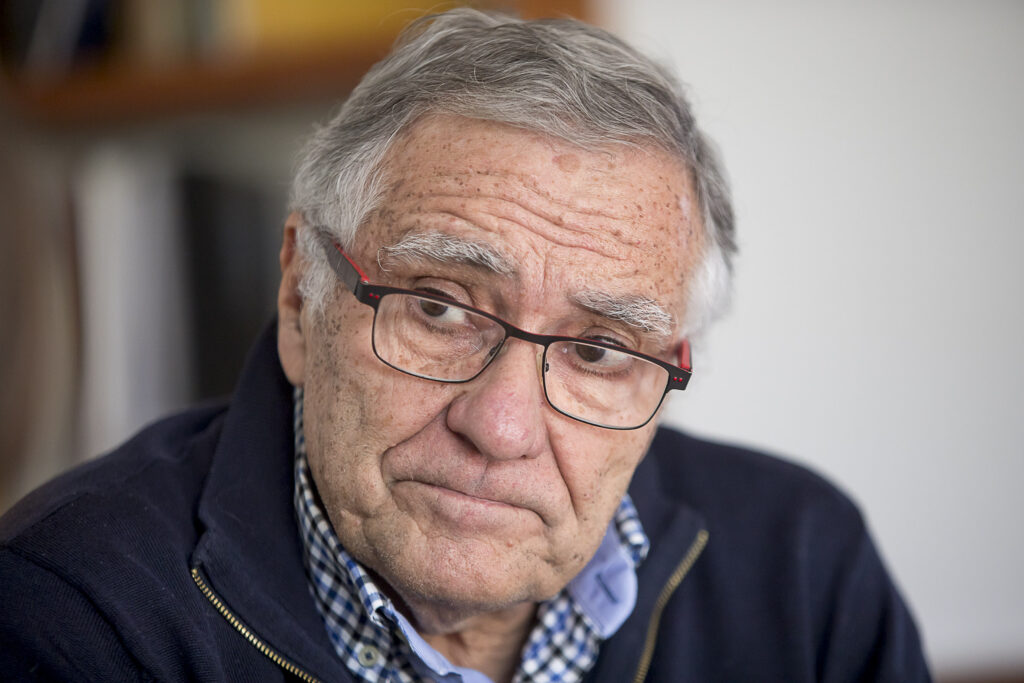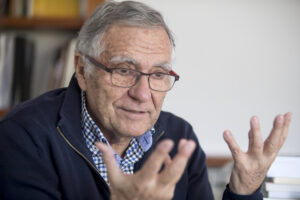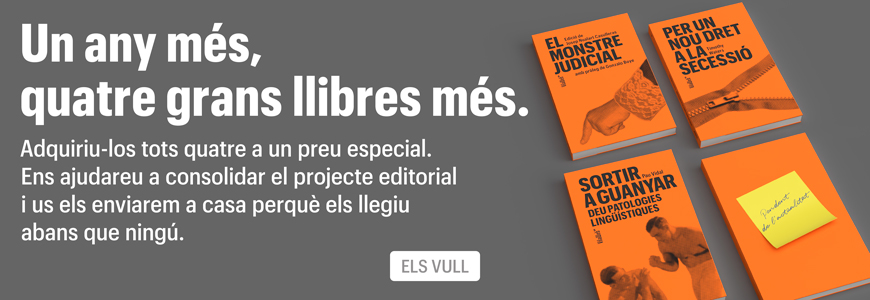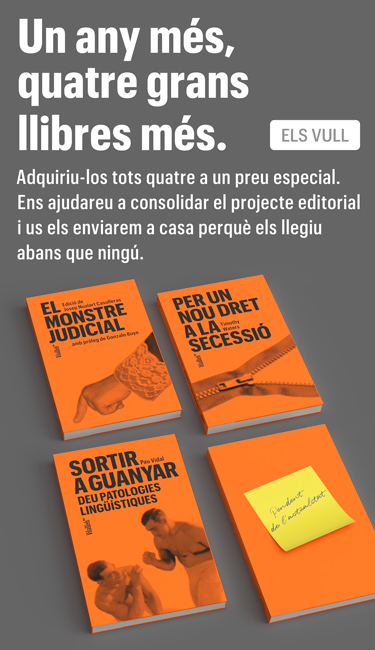02.01.2020 - 08:05
David Ros becomes emotional when he says that his nephew, Jordi Ros, looks forward to receiving postcards at Soto del Real prison. He’s been a picture of calmness while recounting all the dramatic situations that have occurred, but now he hesitates for a few seconds. One can only imagine that he’s been momentarily thrown off kilter by the stark contrast between his nephew’s small wish –to receive some postcards– and a hostile reality in which he’s only allowed to receive two per week.
David Ros, an economist by profession, is the uncle of Jordi Ros, who was arrested in Sabadell [Barcelona] on 23 September [2019], accused out of the blue of belonging to an armed group and still held in solitary confinement in Soto del Real prison. David Ros was the first person to publicly denounce serious irregularities in relation to the arrest and imprisonment of both his nephew and the other detainees. Almost two months after the arrests, their rights continue to be violated. And now everything has been made much worse by the leaking to the media of video excerpts of the statements made [before the judge] by Jordi Ros and Ferran Jolis.
— What impact have the police leaks regarding your nephew Jordi Ros and the other detainees had on you?
— It’s been a shock and the information they’ve leaked has really upset the family. It’s been hurtful in two ways. Firstly, because we’ve discovered that they had microphones in the house, that everything was being recorded, that they were taking photos of the inside of the house from a considerable distance… That’s created a very strong sense of insecurity among the family members most directly affected: their partners. Although they’re keeping their cool, it’s been a real body blow because now they know for sure that they’ve been listened to in their homes around the clock. They’ve felt violated.
— That’s the part of the hurt caused to people. What about the other part?
— It’s the hurt caused by the way things have been explained to public opinion. The purpose of these video leaks is to create an incriminating narrative. It’s very unusual for statements to be leaked in this way. Our lawyer has explained it very clearly: if you don’t have an overall vision, you can’t reach any conclusion. They’ve filtered these excerpts of the statement in order to create opinion. What has been leaked is partial. I must stress that I haven’t seen the indictment because that’s the lawyer’s job and he’s currently examining it. Of the eight volumes that have been made available to him, he still has two left to examine, and there’s a ninth volume that still hasn’t been made available to him.
— How did you find out that the videos were doing the rounds on social networks?
— When my son saw it, he sent me a WhatsApp message saying: “Dad, that’s not Jordi. Something has happened here. That’s not the way he talks. The way he’s constructing his sentences indicates that he’s distressed, either because he hasn’t slept or because he’s been mistreated or he’s drugged.” When I watched it I didn’t recognise him. The first thing he does is apologise to the Spanish Civil Guard officers for making them work overtime. We find it hard to understand these statements because they scream Stockholm syndrome, which is the feeling we had the first time we went to see him. The lawyer described finding him in a “state of shock”. Something happened. We know him; he has sat where you’re sitting now. That’s not the way he talks. I have to admit that I started watching the video and had to stop it. I couldn’t watch it through to the end.
— Has he talked to you about it?
— Some of the other prisoners have explained more things; all he’s told us is that it was absolutely awful. He’s had lots of headaches, which he’s never had before. We’re convinced that from the moment the police forced entry into his home to the moment he entered prison, he was subjected to constant mistreatment. Not physical, because none of them say they were beaten, but he did have a gun pointed at his head and so did his brother, who was in the apartment when they forced entry, and who knows if they made him take [ingest] something.
— One of the first irregularities occurred during the search.
— Jordi was refurbishing his apartment and was living at his brother’s place. His brother had a pistol pointed at him and was forced to spend several hours sitting on the floor, on the stairs. As Jordi was being taken away, his brother said to him: “Collaborate, Jordi; otherwise they’ll beat us and arrest the entire family.” It seems that for Jordi this pressure has been very intense. They also told him that they’d arrest his parents. Bear in mind that once they’d finished searching his apartment they moved on to the home of his parents, who are 70 years old, and had them facing the wall for a good while. Afterwards, while their home was being turned upside down, they weren’t allowed to move.
— Can it be considered torture, what they’ve done to Jordi?
— He and some of the others were transferred [to Civil Guard barracks] with blindfolds on. They weren’t allowed to sleep. Pistols and rifles were pointed at them, and at their parents, siblings, partners and children… One of his fellow detainees was forced to get out of the car blindfolded during his transfer [to Civil Guard barracks]… People who know about these things say this is torture.
— Right from the start, Jordi had no lawyer?
— There were seven detainees and four Alerta* lawyers, who were working for all seven of them. On the Wednesday I found out that Jordi’s Alerta lawyer was Jordi Busquets. I got in touch with him. After a few hours of uncertainty, we discovered that Jordi [Ros] had a duty lawyer and they were saying that he didn’t want a lawyer from the Alerta organisation, despite the fact that we’d instructed it to represent him. We found this very strange indeed. From that moment we grew more and more concerned. We could see that it was Wednesday, that he’d been arrested on Monday and that he had no legal assistance. At that moment, we knew that Jordi had no defence.
*Alerta Solidària is a Catalan anti-repression organisation
— The leaked statement is from those dates?
— Yes, from the dates when the Alerta lawyer wasn’t representing him. The information we were getting is that he wanted the duty lawyer. Lluís Anglada, the lawyer who’s now representing Jordi, says that Jordi shouldn’t have made a statement in his situation. Not only did he make a statement without competent legal assistance but also he ratified the entire statement made before the Civil Guard. This leak is illegal. We the families have reported it and now another court is conducting an investigation to find out who was responsible for it. What’s more, curiously enough, despite being the affected party we don’t have a video; all we have is the audio recording.
— Do you feel defenceless?
— We’ve lodged appeals and we’ll continue to do so. I’m no lawyer but it’s common knowledge that statements made under coercion are invalid.
— Have you seen him since this [leak]?
— We’ve talked to him and he’s upset.
— Has he seen the videos?
— Yes, he has. I suppose they’ve saddened and upset him. For the first month he didn’t want a TV or anything. He just read and read. After he’d been in prison for a month, Jordi wanted a TV. You buy them there inside. But, of course, what channels can you watch? Only the ones available in Madrid.
— He’ll have spent two months in Soto del Real soon, and he’s still in solitary confinement?
— Bear in mind that he’s locked up in a cell measuring approximately 2 metres by 3.5 metres. He and Xavier Duch are in solitary confinement. For the last few weeks they’ve been allowed in the yard together. Now they’re in the yard from 9 am to 1 pm, four hours a day. Until a few days ago there were only three of them. Now there are three other prisoners there. On Sundays, during yard time, they have a pre-lunch snack if they buy a few tins [of food] between them. One of the other prisoners has been inside for longer and fortunately he makes them do exercise, which is very good for them.
— So can he play chess now?
— We wanted to get a little chessboard to him but it just hasn’t been possible. Apparently, he can play because if you ask for the pieces they lend them to you and there’s a chessboard in the yard they can use. He got into chess through his grandfather, who was the Catalan champion in the highest category.
— So what do you think about the explosives?
— According to his lawyer, nothing has been substantiated in this respect in the formal accusation. He’s only just read the indictment. As you know, the lawyers only received it after it was leaked to the press. He [Jordi] refers to a challenge, but I’ve got no idea what he means. What I can say is that my nephew was not doing anything whatsoever to attack people with explosives. I’m absolutely sure of this because even in that very strange statement he constantly denies it. Look, I’ll give you an example of how reality has been distorted: you know that image on TV, in the first video the police released, where you see a storeroom and the camera focuses on a sack with a substance they stir around and show as if it was who knows what? Well, the partner of the lad who lives there told me it was a sack of sawdust from his house.
— Is the house where Jordi lives with his partner still sealed off?
— The house has been sealed off for a month and a half. Jordi’s partner hasn’t been allowed in during all this time. It’s a real drama because when it’s finally unsealed you find you have remake a home that’s been turned completely upside down with a total lack of respect.
— What about the car?
— It’s only now that we can go and collect the cars. They’ve been in Sant Andreu de la Barca all this time and we haven’t been allowed to use them.
— There are lots of people who want to collaborate but aren’t sure how to go about it. Have you opened a bank account for those who wish to make contributions?
— The families now have three types of expenses. The Caixa de Solidaritat (Catalan Solidarity Fund) is helping with legal costs. Then there are the trips to Madrid and we’re very grateful for the help we’ve received in this respect from the Catalan Association for Civil Rights, an organisation created by the families of the political prisoners who’ve already been tried. And, last of all, we have the expenses of the families in order to cover their day-to-day needs. When you find yourself in a new situation like this one, you feel lost. There are household expenses, children’s needs, healthcare costs, basic things… To cope with all of this, we’ve set up the Mutual Support Association for Families of Political Prisoners. We already have a tax ID number and soon we’ll have a bank account. We want everything to be completely transparent.
— Can people send letters? Do they receive them?
— Yes, people can send as many letters as they like, but the detainees in solitary confinement are only allowed to receive two a week. That’s what solitary confinement entails. He was thrilled to get a postcard from a girl in Girona and he looks forward to receiving postcards. He wants to use them to create a story based on the anecdotes that people tell him.
— But what if he doesn’t get them?
— I’ve got a friend who always says that despite that [possibility], we have to keep sending them, that it’s really important to do so. If he doesn’t get them now, he’ll get them later on. He insists that we have to ignore this isolation measure.
— What’s Jordi like?
— For you to see what he’s like, I’ve got a letter here that he wrote to a young drug addict three days before the police came for him. When this lad found out what had happened to Jordi, he brought me a copy of the letter. It’s a letter from the heart, from someone keen to help. It says: “Come on lad, you’ll make it”. That’s what Jordi is like; he enjoys helping people. He and his family ran a printing company that specialised in screen printing. The company was affected by the economic crisis and closed down. Jordi was supposed to start work as a chef the week he was arrested.
— And does he complain about the cold? The other prisoners who’ve been in Soto del Real said they got really cold, that winter is very hard there.
— He’s started to complain about it. He calls the cell his room. He’s in there on his own 20 hours a day. He can see visitors once a week through a glass partition for 40 minutes and we’ve had a two-hour family visit in the same room as him. But the conditions are really tough. The other day, one of the family members who went to see him was taken aback because he was brought into the room by two armed police officers wearing helmets. We’d never seen that before.
— As someone who has formed part of the National Secretariat of the ANC (Catalan National Assembly) and who’s very committed to the independence movement, what’s your take on this situation?
— These arrests form part of a narrative designed to implicate [Catalan] presidents Quim Torra and Carles Puigdemont in violence. It’s not working because this movement is pacifist and the reality is far removed from this media narrative that they’re trying to create. For months now, when you see the Civil Guard somewhere, you think to yourself: “What’s happening today or what’s going to happen?” Whenever they arrest someone or conduct a police operation like this one, it’s because they want to cover up other information. The Civil Guard crudely stages an event in order to create a lot of fuss that covers up something else. These actions are also designed to put the frighteners on people, to say: “Hey! Prison isn’t only for political leaders; now ordinary citizens will be banged up as well.”
— But the response of the independence movement has been extraordinary. The attempt to criminalise people hasn’t worked. The very first demonstration in Sabadell [after the arrests] was extremely well attended.
— Many people who mobilise do so out of dignity. This dignity is what makes lots of people refuse to accept the backsliding on human rights that has occurred in this country. The violation of rights is so great that many people have risen up. They used to say that only the senior citizens of the ANC (Catalan National Assembly) attended demos but [the referendum of] 1 October [2017] saw the incorporation of citizens from the younger generation, who protected the polling stations. That was very important because it was the incorporation of a whole generation of citizens from all walks of life: from electricians to people with two master’s degrees. And now, since 14 October [2019], a whole new generation has joined them.
— Has the intimidation worked?
— We can’t be insensitive and let them do what they want. No, the situation is outrageous… People are outraged. I’ve taken taxis in the last few days and found a sense of empathy that was unimaginable before. There’s a conviction that they’re doing something wrong and it’s unacceptable. I like a phrase I heard Boye* say: “We mustn’t be Euro-sceptical but rather Euro-demanding.” It’s essential for people to mobilise peacefully and non-violently. We can’t accept this situation. I’m one of those who think that patience, perseverance and perspective will end up achieving the results we’ve set out to accomplish.
*Gonzalo Boye, lawyer of Catalan presidents Carles Puigdemont and Quim Torra
[This interview was translated by Dave Evans].







